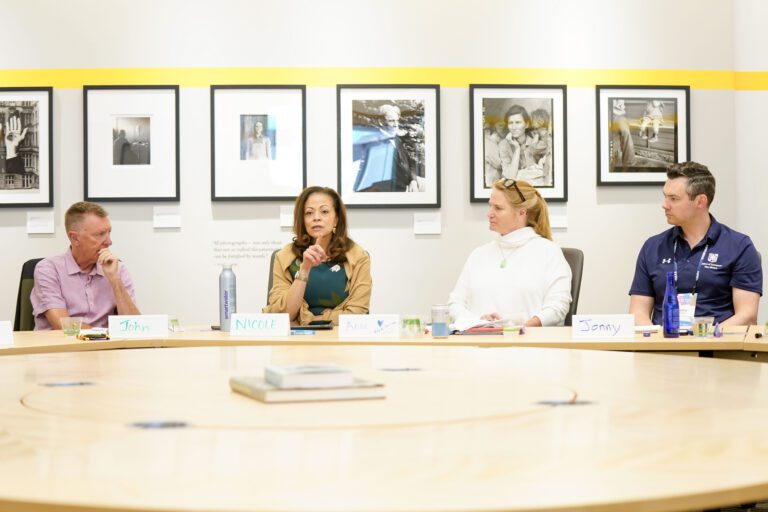Collaboration and A Woman’s Nation

Last week I had the privilege of attending The Atlantic Presents the Shriver Report LIVE in Washington, DC, where a remarkable mix of leaders shared big ideas on how to lift all women toward opportunity. It was a celebratory launch for The Shriver Report: Women Pushing Back From the Brink. Equally importantly, it was also an opportunity for the report’s chapter authors – including Ascend’s Anne Mosle, who wrote Personal Action, Collective Impact – to share findings from their work in a series of rapid-fire panels with the 12,000 (and counting) people who tuned in to the webcast.
I watched Anne speak with three other leaders doing very different and valuable work – Kirsten Lodal of LIFT; Randi Weingarten of American Federation of Teachers; and Mayor Kasim Reed of Atlanta. I was struck by a theme that kept cropping up: the importance of collaboration. Collaboration between men and women; collaboration between political parties; collaboration among myriad systems and organizations.
As Maria Shriver points out in her introduction to the Shriver Report, women now comprise half the U.S. workforce and two-thirds of the primary or co-breadwinners in American families. And yet one in three American women is living at or near the brink of poverty. In listening to Anne, Kirsten, Randi, and Mayor Reed, it became clear that addressing the complex roots of this problem requires a new way of working.
The concept of collaboration is certainly not a new one, but as Anne pointed out last week, many of our institutions and systems have not caught up with the significant demographic shifts – and rising levels of poverty – among women in the United States. In our work at Ascend, we believe collaboration through a two-generation approach will help break the cycle of poverty. Anne highlights this as a core solution in her Shriver chapter.
Over the last two years I have interviewed dozens of leaders of two-generation programs, which provide opportunities for and meet the needs of low-income children and their parents together. They also speak to the importance of collaboration, for example, in a Head Start program successfully addressing parents’ educational goals. As the panel and these leaders agreed, whether we are developing or implementing new ideas, there are some central tenets to consider:
· Collaboration: how can we partner to bring in new skills or achieve the results we seek? Whether it is about public-private partnerships to improve child care access for working mothers or ensuring a city government like Atlanta’s provides equal pay to all its employees, collaboration matters.
· Listen: what do parents need, and what does the community need? At Ascend, the voices of families are central to our work, and as Anne shared, their perspectives should inform the strategies we develop to improve their lives.
· Build on what works: Kirsten Lodal talked about the importance of data collection in LIFT’s national model, through which college students provide benefits access support and referrals to community members. By tracking outcomes, we can more effectively partner with those who can improve our results.
· Take risks: Mayor Kasim Reed said that he is committed to ensuring that every woman who works for him makes the same amount as a man in the same position. In doing so, Mayor Reed is setting a vital precedent other city leaders can follow.
One of my favorite examples of collaboration is the one between Maria’s father, Sargent Shriver, and President Lyndon B. Johnson, who together – despite some political differences – partnered on the War on Poverty, creating the Office of Economic Opportunity from which emerged such crucial initiatives as Head Start and Community Action Programs. The Shriver Report is a recognition of this collaboration’s 50th anniversary. But it also represents a collection of ideas – from two-generation approaches to a new “life education” – that have the potential to shape the lives of women and men for the next 50 years.
To read Anne Mosle’s chapter from The Shriver Report, visit our Shriver Report section.
Related Posts



